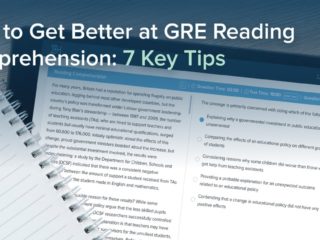| Getting your Trinity Audio player ready... |
Last Updated on January 24, 2024
If you find that you’re going through GRE reading passages and not understanding or retaining what you’re reading, you may be dealing with the very common problem of losing focus due to boredom in GRE Reading Comprehension (RC).
Many test-takers dread RC questions in GRE Verbal because they find reading passages boring. On the other hand, some test-takers may not recognize that boredom while reading is a large part of why they can’t seem to make much headway in RC. Rather, these struggling readers attribute their lack of progress to “poor reading skills” that they assume they’re powerless to change.
Whether you’re painfully aware of your boredom while reading or not quite sure why you never seem to absorb the information in GRE passages, I’ve got good news for you. With just a few GRE Reading Comprehension strategies for combating boredom and maintaining focus, you can see a significant improvement in your ability to understand and retain what you read in passages, and thus increase the speed and accuracy with which you answer RC questions.
So, read on for 5 easy and effective tips on how to read GRE passages with focus, purpose, and excitement!
Here are the topics we’ll cover:
- GRE Reading Comprehension Fast Facts
- How “Bored Reading” Affects Your Score
- Tip 1: Fake It Till You Make It
- Tip 2: See RC as an Opportunity to Learn
- Tip 3: Keep Your Eyes on the Prize
- Tip 4: Create a “Reset” Mantra
- Tip 5: Read Aloud During Untimed Practice
- Key Takeaways
- What’s Next?
Before we cover our strategies, let’s discuss the nuts and bolts of GRE Reading Comprehension.
GRE Reading Comprehension Fast Facts
The first step in mentally preparing yourself for GRE Reading Comprehension is knowing what to expect. So, let’s answer a few common questions about RC questions.
How Many Reading Comprehension Questions Are on the GRE?
About half of the Verbal questions you see on the GRE will be Reading Comprehension questions. So, you can expect to see around 13 Reading Comprehension questions across the 2 Verbal sections. Those questions will be distributed in varying amounts among around 2 or 3 passages per section.
Thus, you will see a total of about 4-6 reading passages and about 13 RC questions on your exam.
KEY FACT:
There are a total of about 13 Reading Comprehension questions, distributed among roughly 6-8 passages, on the GRE.
How Long Are Reading Comprehension Passages?
A Reading Comprehension passage may be anywhere from 1 short paragraph to 4 or 5 paragraphs long. However, most passages are 1 paragraph, and you might see only 1 “long” passage in total. In general, passages tend to be around 125 to 475 words (except for Critical Reasoning-style passages, which may be as short as around 50 words).
Note that there can be anywhere from 1 to 6 questions associated with a passage. Furthermore, shorter passages are not always associated with fewer questions than longer passages are. It’s true that you’re unlikely to come across a 1-paragraph passage associated with 6 questions. However, you could certainly see 1 or 2-paragraph passages associated with 3 or 4 questions each.
KEY FACT:
Regular RC passages tend to be anywhere from 125 to 475 words long.
What Are Reading Comprehension Passages About?
GRE Reading Comprehension passages are based on material found in books (academic and nonacademic), newspapers, and magazines. The subject matter of Reading Comprehension passages encompasses the following broad topics:
- social sciences
- physical and biological sciences
- arts and humanities
So, we may see passages discussing art, music, film, literature, linguistics, history, anthropology, sociology, philosophy, economics, nature and the environment, astronomy, biology, physics, or technology, to name some of the possible topics. Those discussions could be framed as art or literary criticism, an analysis of a historical event or of a historical figure’s contributions, an explanation of a scientific process, or competing perspectives in a field of scholarship, just to name a few examples.
Note that, in addition to the topics above, business and everyday scenarios may be covered in Critical Reasoning (CR) passages. However, since CR passages are so short — sometimes only a single sentence — boredom generally isn’t a factor in reading them. So, we’ll focus on the “regular-style” RC passages in this post. (For Critical Reasoning tips, check out this article on mastering CR.)
KEY FACT:
RC passages cover topics in the social sciences, physical and biological sciences, and arts and humanities. Additionally, some CR-style passages cover business and everyday scenarios.
Now that we understand the nuts and bolts of GRE RC, let’s discuss why boredom while reading RC passages can be a big problem for your Verbal score.
How “Bored Reading” Affects Your Score
Staying engaged and interested in every passage you read, regardless of the topic, is a major key to success in GRE RC. If your mind is wandering or you give in to boredom, guess what you’re not doing? You’re not focusing on overall meaning. You’re not noticing key relationships, conclusions reached, or differing perspectives. You’re not positioning yourself to understand the flow of the passage and thus have a sense of where in the passage different things are discussed.
So, is it any wonder that test-takers who lose focus because of boredom struggle to answer questions about the passage? Is it any wonder that they take longer to find the details they need to answer questions?
Comprehending what we read requires staying alert, aware, engaged, and interested — there is scientific evidence establishing this truth. For example, a 2020 study of 306 students learning English as a foreign language found that boredom while reading had a “significant but negative” relationship with reading comprehension performance. To assess the relationship, researchers asked the students to complete questionnaires and a reading comprehension test. When students felt bored while reading, their test performance worsened. Several previous studies have produced similar findings.
But you know what else the 2020 study found? Strategies for coping with boredom while reading helped! In other words, when the students implemented such strategies, their boredom was reduced and their reading comprehension performance improved.
TTP PRO TIP:
Staying engaged and interested in every passage you read, regardless of the topic, is a major key to success in GRE RC.
With that in mind, let’s take a look at my top 5 most effective strategies for combating boredom when reading GRE RC passages.
Tip 1: Fake It Till You Make It
Sometimes we have to “trick” our brains into believing something is true by pretending that it’s true. Then, over time, our brains become trained to actually think the way we want them to.
In other words, sometimes we have to “fake it till we make it.”
Try treating every RC passage as if it’s a very important document that was written specifically to give you information that you’ve been waiting for and really need to know. Or treat each passage like an excerpt from a manuscript written by your best friend, who wants you to read it before she sends it off to a publisher. Giving yourself even a fake reason to be interested can help you stay engaged with the material.
On the other hand, if you’re repeatedly telling yourself, “this is so boring” or “who cares,” guess what? You’re going to be bored and you’re not going to care. And as we’ve discussed, reading comprehension performance worsens in test-takers who are bored and disengaged.
Still not convinced that faking it till you make it can help “trick” your brain? A professor of psychology at the University of Rochester, Jeremy Jamieson, found that college students performed better on GRE practice tests — and on the real thing — when they told themselves that stress they felt during the test could be helping them perform better. Similarly, Harvard Business School Professor Alison Wood Brooks found that graduate students performed better at solving math problems under time constraints when they told themselves they were excited, rather than anxious, about completing the task.
We tell ourselves things all the time to pump ourselves up and think positively. We can apply that same concept to combating boredom.
TTP PRO TIP:
Pretending that you’re interested in what you’re reading can help you stay engaged.
Tip 2: See RC as an Opportunity to Learn
Another way to trick your brain into staying engaged in what you’re reading is to treat every RC passage as an opportunity to learn something new. For example, maybe on your own you would never seek out information about the monitoring of ice floes in Antarctica. But if you see it in an RC passage, well, you have to read about it, so you might as well get something out of it! And hey, you never know when you’ll be able to whip out your knowledge and impress someone!
The fact is, in reading GRE passages, you can be exposed to a lot of information that you wouldn’t otherwise come across. You can also learn more about topics you have only superficial knowledge of. So, why not take full advantage of an opportunity to learn something new?
You can also try treating each passage like reading material for a class you’re taking. We don’t expect to be 100% interested in every bit of reading material required for college classes, right? But we’re there to learn and we pay attention, and more often than not, we get something out of it.
TTP PRO TIP:
Look at every RC passage as an opportunity to learn something new or to enhance your expertise in a topic.
Tip 3: Keep Your Eyes on the Prize
At the end of the day, the time you spend preparing for and taking the GRE is a brief period of your life. However, the benefits you reap from a great GRE score can have a major impact on your education and career.
Of course, in the midst of all the ups and downs of studying for your exam, it can be easy to lose sight of what you stand to gain. Particularly if some aspect of your studies feels like a grind, staying motivated and focused can be tough.
So, it can be helpful for students who feel bored when reading RC passages to remind themselves why performing at their best is so important. What goals will scoring well on the GRE help you accomplish? Why are these goals important to you? How will achieving them improve your life?
Sometimes we need to remind ourselves why we’re doing what we’re doing, and why it’s important to give it our best shot. If boredom starts to take hold when you’re reading a GRE passage, give yourself a quick reminder.
Take this exercise to another level by considering how the task of focusing on what you’re reading will benefit you. How would becoming a more engaged and focused reader help you in areas of your life outside of the GRE? Could this skill benefit you in grad school, your career, or beyond? I think you’ll find that the answer is YES!
TTP PRO TIP:
Reminding yourself why it’s so important to perform well in GRE RC, and what your broader goals are, can help you stay engaged in what you’re reading.
Tip 4: Create a “Reset” Mantra
When your mind starts wandering, one way to snap your attention back to what you’re reading is by using a “reset” mantra. This mantra should be something simple that you can silently say to yourself to interrupt your wandering thoughts, so you can refocus on the passage.
For instance, say you notice your inner monologue turning to what you’ll do after your study session is finished or how you’d rather be doing anything else. Stop, recite your mantra, and get back to the passage.
Some “reset” mantras you can try include, “ready, set, go,” “you got this,” or simply “concentrate.” Use whatever mantra helps you feel grounded and present in the moment.
TTP PRO TIP:
Create a simple mantra that you can recite to interrupt your thoughts and refocus your attention when your mind begins to wander.
Tip 5: Read Aloud During Untimed Practice
Some students who struggle with staying focused while reading RC passages find it helpful to read aloud. Reading aloud encourages students to be more active participants in the reading process. Because reading aloud is both a visual and vocal task, it engages more of your brain and helps eliminate your ability to be distracted by other things. You’re forced to pay attention to the words you’re seeing on the screen, rather than allow them to simply wash over you. And reading aloud can just be more interesting and fun.
Scientific research has found that reading aloud helps reduce mind wandering. One study published in the journal Frontiers in Psychology compared the effects on mind wandering of three different methods of engaging with a written text: reading aloud, reading silently, and being read to. The study found that “reading aloud led to the least amount of mind wandering.” And when do our minds tend to wander? When we’re bored!
Of course, reading aloud won’t always be practical during your RC prep. For one, reading aloud slows us down. So, I instruct students to use this technique only when doing untimed practice. If possible, use reading aloud as a way of training yourself to stay engaged and focused, but taper off this practice as you become more skilled. That way, you’ll be accustomed to speedier, silent reading by the time you start practicing RC under time constraints, and you’ll be properly prepared for test day, when reading aloud won’t be an option.
Reading allowed is a temporary weapon in the fight against boredom, but it can be a powerful one!
TTP PRO TIP:
Read aloud during untimed practice to help train yourself to stay engaged and focused when reading RC passages.
Key Takeaways
Fighting boredom while reading can feel like a losing battle, but with specific strategies for resetting your focus and increasing your level of engagement, you can significantly improve your comprehension of RC passages.
So, if you feel bored or your mind starts to wander when you’re reading RC passages, try the following strategies:
- Fake it till you make it!
- See RC as an opportunity to learn.
- Keep your eyes on the prize.
- Create a “reset” mantra.
- Read aloud during untimed practice.
What’s Next?
For more GRE Reading Comprehension tips and tricks, check out these 7 key strategies for RC success.
Struggling with anxiety about your exam? These scientifically backed strategies for reducing anxiety can help.



